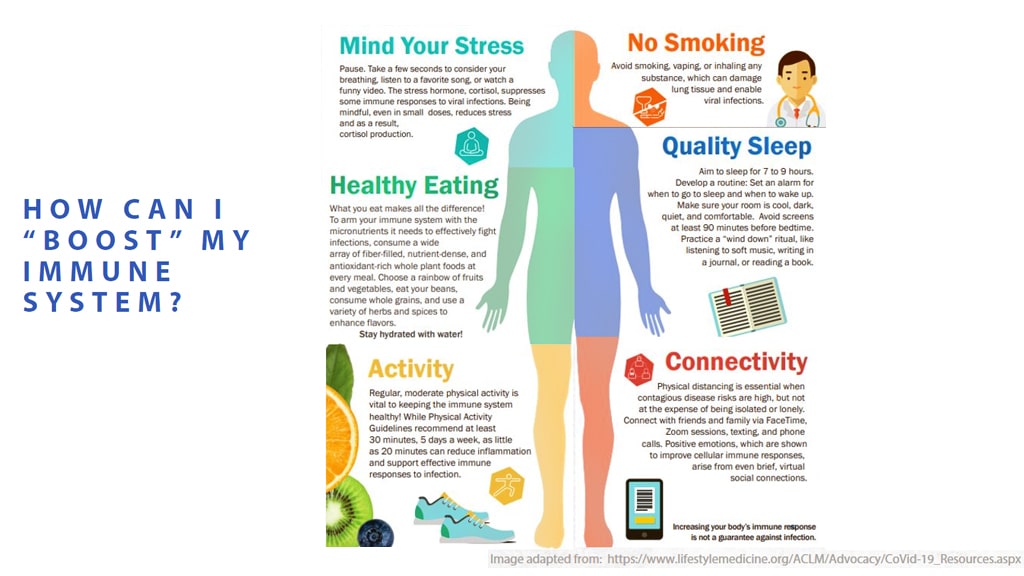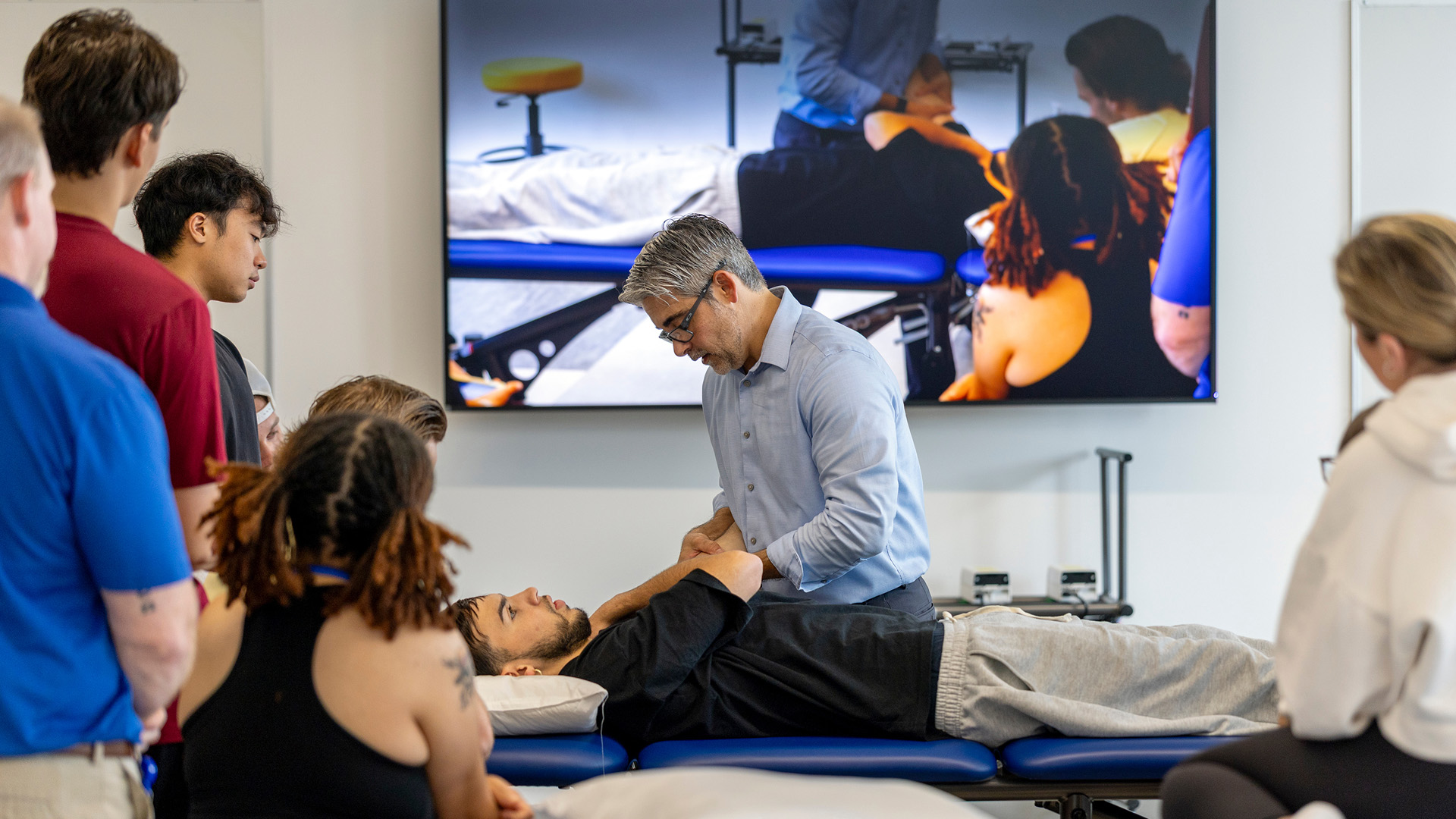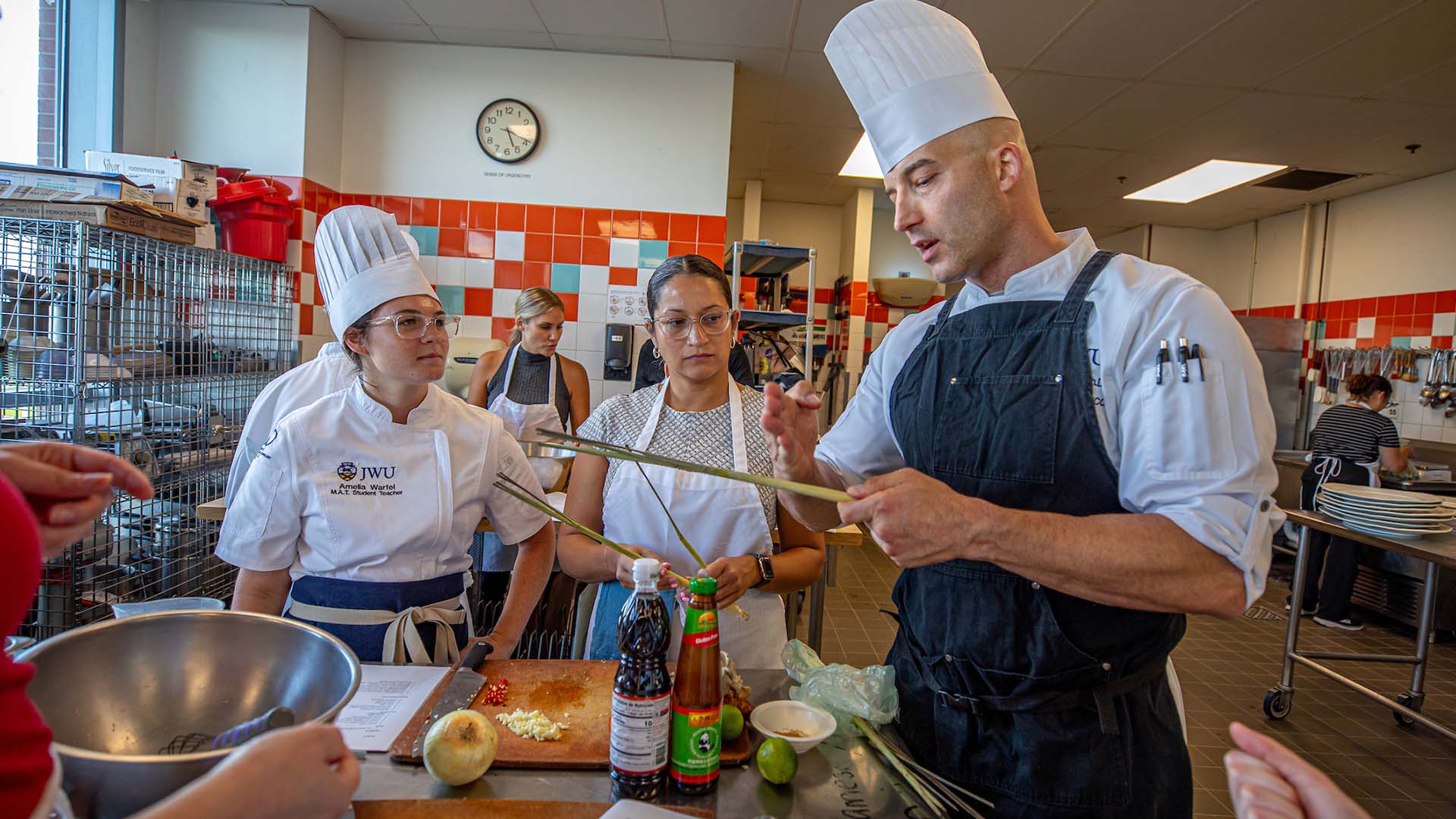Dietitian-Approved Strategies for Boosting Your Immune System
Pandemic or no, keeping one’s immune system in balance is a constant battle. Think of your body as an interconnected system where inputs as wide-ranging as food and activity (mental and physical) to stress and sleep patterns can have positive or negative effects on your overall systemic health.
But for Associate Professor Kara Cucinotta, MS, RDN, LDN, CNSC, '06 — registered dietitian, doctoral candidate in clinical nutrition and department chair of JWU Providence’s Dietetics and Applied Nutrition program — optimizing your immune system doesn’t have to be a mystery. And it doesn’t require a long list of apps or adaptogens, either; with careful planning, you can make some small changes that can have a big impact. Think of it as a preventative and maintenance approach vs. a reactive one. “It’s important to take a holistic approach to make sure that we’re looking at all these different facets of what it takes to support your immune system.”
1) Physical Activity
“For physical activity the recommendations are to get at least 150 minutes (upwards of 300 minutes per week), which translates to at least 30 minutes a day, 5 days a week,” explains Cucinotta. “But this can be broken up in whatever way suits your lifestyle.”
That said, “do what you can” is Cucinotta’s big takeaway here – something is definitely better than nothing.
“It’s important to take a holistic approach to make sure that we’re looking at all these different facets of what it takes to support your immune system.”
And if you’ve been sedentary, the trick is to start moving, and to try to make it consistent. So the best bet is to find something you love. If it’s dancing rigorously to your favorite records – do that! If it’s running or speed walking, go for it. Just find something you like and try to stick with it. Your goal is to feel good and to reduce cortisol levels (which can elevate stress), so anything that helps you break a sweat is win-win.
2) Stress Reduction and Self Care
Cucinotta highly recommends incorporating some kind of meditative practice into your daily routine. This can take all kinds of forms, from breathing exercises to qi gong, meditation, tai chi, etc. The benefits of doing so can be profound; mediation has have been proven to reduce our body’s “fight or flight” response, help us tune in to our parasympathetic nervous system (the body’s “reset” button) and promote an overall sense of well-being.
3) Sleep
Getting a solid night’s rest can be elusive, particularly during the stressful times of the pandemic. As with incorporating meditation, building good sleep habits can be as simple as making some slight changes to your evening routine.
One big contributor to poor sleep is the backlit blue light of our devices. News flash: Doom-scrolling through the day’s news or catching up on social media is definitely NOT a good idea before bed.
In fact, devices should be banished entirely from the bedroom. You want the room dark, quiet, and not too warm. (Heat disrupts the natural circadian rhythm of our sleep cycle.) You don’t want to snack before bed, either – having something small, like a glass of warm milk or a handful of pistachios (both of which contain natural melatonin), is okay an hour or two before bed.
4) Diet and Nutrition
For Cucinotta, the trick is to get as much of your daily recommended vitamins and minerals directly from food. Some are easier than others to get from what we eat, but in general, “eating the rainbow” is going to get you most (if not all) of the way there. You want variety, and that includes lots of veggies and fruits. LOTS.
Vitamin A: This powerful antioxidant that helps create new cells (including immune cells) and neutralize free radicals, which are damaging. Found in beta-carotene-heavy veggies like carrots, broccoli, and dark, leafy greens like kale.
Vitamin C: Another powerful antioxidant that helps to fight infections and neutralize free radicals. Found in citrus fruits, as well as cruciferous vegetables like broccoli, cabbage, cauliflower and kale.
Vitamin D: Found in fatty fish, fortified dairy products, eggs and mushrooms grown in UV light. Can be hard to get enough through diet; supplements may be needed.
Vitamin E: This is another antioxidant this helps to keep our cells healthy. Alpha tocopherol is the form that our body utilizes very well. Found in whole grains, nuts/seeds, avocado. Found in different oils as well but olive oil tends to have the richest source but vitamin e is a very important antioxidant.
Zinc: Involved in enzymatic production; might also play a role in decreasing the ability of viruses to replicate so it might be able to help with viral infections. Crucially, it’s also been found to decrease the severity of the duration of illnesses. Found in most protein-containing foods, including seafood, meats, beans, whole grains and breakfast cereals.
Selenium: This mineral is actually part of our body’s antioxidant enzymes. Important in supporting our body’s ability to fight infections and to reduce oxidative stress. One brazil nut can get you more than your total daily amount; seafood, dairy products, and wheat products all have good amounts of selenium.
Iron: Important for our blood health; in addition, this structural mineral is part of different cells in our body, including immune cells. It’s also part of what our cells use to create oxidative bursts where it actually kills bacteria. Most concentrated in meat sources; if you’re consuming vegetarian sources just make sure you’re pairing it with a Vitamin C source to optimize absorption.
Omega-3s: These fatty acids are part of every cell membrane in our body. Important for decreasing overall inflammation in our body so that our immune system is working the way that it should. We’re not able to make them so we do have to eat them. Alpha linolenic acid (ALA) is found in flax seeds, chia seeds, walnuts, canola/soybean oils. Eicosapentaenoic acid (EPA) and docosahexaenoic acid (DHA) and are found in fatty fish, shellfish and very small amounts of seaweed.
Keeping our gut healthy is a massively crucial part of our diet equation. Notes Cucinotta, “Our GI tract makes up about 80% of our immune system, which most people don’t realize. We have millions and trillions of good bacteria that live all throughout our body. And in our GI tract, those good bacteria actually form a physical barrier that helps to prevent bacterial infections.”
To make sure that we’re feeding our good bacteria, load up on prebiotics, which include complex carbs, fiber sources, beans, bananas, the onion family, artichokes and asparagus. In addition, most fermented or cultured foods like yogurts, sauerkraut, miso and kimchi are great at promoting good bacterial growth.
Avoid/limit the following:
- Refined carbs (white bread, white rice)
- Red meat and processed meats (<1x/week)
- Alcohol
- Fried foods (they promote inflammation)
A good rule of thumb is 85-15: 85% of your diet should be healthful stuff and 15% can be more indulgent foods. (Basically, out of a 2000 calorie diet, you have ~300 calories to do what you want with.) Myplate.gov has a great planner for you if you want a visual idea of what a balanced plate should look like. “To reduce inflammation and to increase antioxidants and the overall health for your immune system, I would recommend the DASH diet, the Mediterranean diet or this combination of the two called the Mind diet,” says Cucinotta.
Cucinotta closed out her discussion with a segment on supplements, which are appealing because they offer the illusion of a pill solution to nutritional-immuno nirvana. But the goal should always be to get your nutrients from food.
If you do need a supplement (for example, Vitamin D because your levels are low), ALWAYS consult a health professional and always take their dosage recommendations. “They’re not as harmless as most people tend to think,” she cautions. “They can interact with many medications, and they also can be unsafe for certain medical conditions.” If your physician okays a particular supplement, make sure to look for the seals of one or more of the third-party companies that assess supplements for quality. “But again, it’s much better for you to get your nutrients from food sources. So eat your fruits and vegetables!”
Watch Cucinotta’s entire presentation below. You can also review her resources and follow the Dietetics & Applied Nutrition program on Instagram.
BANNER BY BROOKE LARK ON UNSPLASH. BELOW: SLIDE FROM CUCINOTTA’S TALK.




